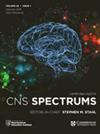Using educational psychology to reform rail transit teaching on bipolar depression in higher vocational colleges
IF 3.4
3区 医学
Q2 CLINICAL NEUROLOGY
引用次数: 0
Abstract
Background Bipolar depression is a mental illness accompanied by manic episodes and depression, and the course of the illness is cyclic and repetitive. The pathogenesis is related to genetic factors, neurotransmitters, neuroendocrine, biorhythms and some psychosocial factors. In order to explore more intervention methods of bipolar depression, this study introduced educational psychology into rail transit teaching in higher vocational colleges to explore the mechanism and effect of this method on students with bipolar depression. Subjects and Methods 64 students with bipolar depression in a higher vocational college were randomly divided into experimental group and control group. The experimental group received the teaching course education of educational psychology reform. The scores of Young Mania Rating Scale (YMRS), Self-Rating Depression Scale (SDS), Acceptance and Behavior Questionnaire Second edition (AAQ-II), and Social Dysfunction Screening Scale (SDSS) were compared before treatment, 2 weeks after treatment, 4 weeks after treatment, and 8 weeks after treatment. Results The scores of Yang’s Mania Scale, self-rating Depression Scale, the second edition of Acceptance and Behavior Questionnaire and Social Dysfunction Screening Scale were lower than those before the experiment ( P <0.05), and the difference was statistically significant. Conclusions The curriculum education of educational psychology reform has a positive effect on patients with bipolar depression. The patients’ emotional stability is improved, depressive symptoms are alleviated, suicidal thoughts are gradually weakened, mania symptoms are alleviated and physical symptoms are gradually recovered. Acknowledgement The research is supported by: This paper is a project of Chongqing education commission, “Risk identification of urban level intersection based on driver’s eye movement characteristics” (No. KJQN202005705).运用教育心理学改革高职院校轨道交通双相抑郁症教学
背景双相抑郁症是一种伴有躁狂发作和抑郁的精神疾病,病程是循环和重复的。其发病机制与遗传因素、神经递质、神经内分泌、生物节律及一些社会心理因素有关。为了探索更多对双相抑郁症的干预方法,本研究将教育心理学引入高职院校轨道交通教学,探讨该方法对双相抑郁症学生的干预机制和效果。对象与方法将64名高职学生随机分为实验组和对照组。实验组接受教育心理学改革的教学课程教育。比较治疗前、治疗后2周、治疗后4周、治疗后8周青年躁狂症评定量表(YMRS)、抑郁自评量表(SDS)、接受与行为问卷第二版(AAQ-II)、社会功能障碍筛查量表(SDSS)得分。结果杨氏躁狂症量表、抑郁自评量表、第二版接受与行为问卷、社交功能障碍筛查量表得分均低于实验前(P <0.05),差异有统计学意义。结论教育心理学改革课程教育对双相抑郁症患者有积极作用。患者情绪稳定性改善,抑郁症状减轻,自杀念头逐渐减弱,躁狂症状减轻,躯体症状逐渐恢复。本文是重庆市教委项目“基于驾驶员眼动特征的城市水平交叉口风险识别”(项目编号:No. 5502)。KJQN202005705)。
本文章由计算机程序翻译,如有差异,请以英文原文为准。
求助全文
约1分钟内获得全文
求助全文
来源期刊

CNS Spectrums
医学-精神病学
CiteScore
6.20
自引率
6.10%
发文量
239
审稿时长
>12 weeks
期刊介绍:
CNS Spectrums covers all aspects of the clinical neurosciences, neurotherapeutics, and neuropsychopharmacology, particularly those pertinent to the clinician and clinical investigator. The journal features focused, in-depth reviews, perspectives, and original research articles. New therapeutics of all types in psychiatry, mental health, and neurology are emphasized, especially first in man studies, proof of concept studies, and translational basic neuroscience studies. Subject coverage spans the full spectrum of neuropsychiatry, focusing on those crossing traditional boundaries between neurology and psychiatry.
 求助内容:
求助内容: 应助结果提醒方式:
应助结果提醒方式:


